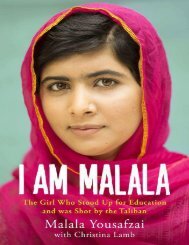i-am-malala-pdf-book-by-malala-downloaded-4m-pakistanifun.commalala-yousafzai-christina-lamb-converted
free ebook read more story visit xnxx-video.ga
free ebook
read more story visit xnxx-video.ga
Create successful ePaper yourself
Turn your PDF publications into a flip-book with our unique Google optimized e-Paper software.
y the CIA. Children in the refugee c<strong>am</strong>ps were even given school text<strong>book</strong>s produced <strong>by</strong> an<br />
American university which taught basic arithmetic through fighting. They had ex<strong>am</strong>ples like, ‘If out<br />
of 10 Russian infidels, 5 are killed <strong>by</strong> one Muslim, 5 would be left’ or ‘15 bullets – 10 bullets = 5<br />
bullets’.<br />
Some boys from my father’s district went off to fight in Afghanistan. My father remembers that<br />
one day a maulana called Sufi Moh<strong>am</strong>mad c<strong>am</strong>e to the village and asked young men to join him to<br />
fight the Russians in the n<strong>am</strong>e of Isl<strong>am</strong>. Many did, and they set off, armed with old rifles or just axes<br />
and bazookas. Little did we know that years later the s<strong>am</strong>e maulana’s organisation would become the<br />
Swat Taliban. At that time my father was only twelve years old and too young to fight. But the<br />
Russians ended up stuck in Afghanistan for ten years, through most of the 1980s, and when he bec<strong>am</strong>e<br />
a teenager my father decided he too wanted to be a jihadi. Though later he bec<strong>am</strong>e less regular in his<br />
prayers, in those days he used to leave home at dawn every morning to walk to a mosque in another<br />
village, where he studied the Quran with a senior talib. At that time talib simply meant ‘religious<br />
student’. Together they studied all the thirty chapters of the Quran, not just recitation but also<br />
interpretation, something few boys do.<br />
The talib talked of jihad in such glorious terms that my father was captivated. He would endlessly<br />
point out to my father that life on earth was short and that there were few opportunities for young<br />
men in the village. Our f<strong>am</strong>ily owned little land, and my father did not want to end up going south to<br />
work in the coal mines like many of his classmates. That was tough and dangerous work, and the<br />
coffins of those killed in accidents would come back several times a year. The best that most village<br />
boys could hope for was to go to Saudi Arabia or Dubai and work in construction. So heaven with its<br />
seventytwo virgins sounded attractive. Every night my father would pray to God, ‘O Allah, please<br />
make war between Muslims and infidels so I can die in your service and be a martyr.’<br />
For a while his Muslim identity seemed more important than anything else in his life. He began to<br />
sign himself ‘Ziauddin Panchpiri’ (the Panchpiri are a religious sect) and sprouted the first signs of a<br />
beard. It was, he says, a kind of brainwashing. He believes he might even have thought of becoming<br />
a suicide bomber had there been such a thing in those days. But from an early age he had been a<br />
questioning kind of boy who rarely took anything at face value, even though our education at<br />
government schools meant learning <strong>by</strong> rote and pupils were not supposed to question teachers.<br />
It was around the time he was praying to go to heaven as a martyr that he met my mother’s brother,<br />
Faiz Moh<strong>am</strong>mad, and started mixing with her f<strong>am</strong>ily and going to her father’s hujra. They were very<br />
involved in local politics, belonged to secular nationalist parties and were against involvement in the<br />
war. A f<strong>am</strong>ous poem was written at that time <strong>by</strong> Rahmat Shah Sayel, the s<strong>am</strong>e Peshawar poet who<br />
wrote the poem about my n<strong>am</strong>esake. He described what was happening in Afghanistan as a ‘war<br />
between two elephants’ – the US and the Soviet Union – not our war, and said that we Pashtuns were<br />
‘like the grass crushed <strong>by</strong> the hooves of two fierce beasts’. My father often used to recite the poem to<br />
me when I was a child but I didn’t know then what it meant.<br />
My father was very impressed <strong>by</strong> Faiz Moh<strong>am</strong>mad and thought he talked a lot of sense, particularly<br />
about wanting to end the feudal and capitalist systems in our country, where the s<strong>am</strong>e big f<strong>am</strong>ilies<br />
had controlled things for years while the poor got poorer. He found himself torn between the two<br />
extremes, secularism and socialism on one side and militant Isl<strong>am</strong> on the other. I guess he ended up<br />
somewhere in the middle.




